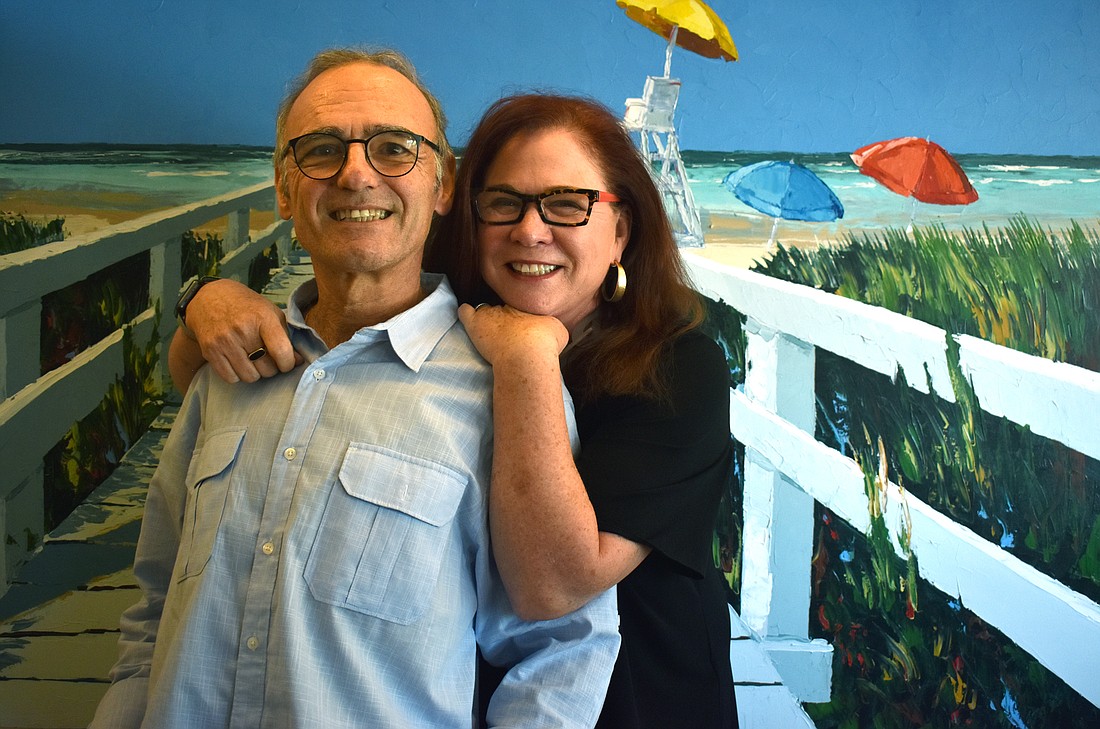- November 16, 2024
-
-
Loading

Loading

Last fall, Ferruh Muktar went for his routine annual physical.
Over the course of the exam and lab work, Muktar was told his red-blood cell count was lower than normal. Not immediately alarmed, his doctor sent him home with instructions to eat more iron-rich foods.
Months later, Muktar, who runs Key Concierge and Key Culinary Tours on St. Armands Circle with his wife, Susan Robinson, followed up with his doctor and found the count even lower.
Ultimately, a hematologist diagnosed the condition as myelofibrosis, a rare bone marrow cancer.
Ordinarily, the spleen can account for red-blood cell production in such a case, but that can strain the spleen, causing it to enlarge.
Muktar, 63, is on medication to regulate the size of his spleen, but he finds himself getting run down most afternoons, the opposite of his normal energy level. Robinson said he was always like the Energizer bunny.
There is good news though. Myelofibrosis is curable.
The trick, however, is that it requires a bone marrow transplant, which mean Muktar needs to find a donor.
“It’s not like, ‘take two aspirin and call me in the morning,’” Robinson said.
On July 10, Muktar’s information was entered into the Be the Match worldwide repository. So far, Muktar has not been matched.
“The fact that the first time around [he didn’t get a match] is not horrifying to us because as I say, these things change all day as people come into the repository every single day,” Robinson said. “Hundreds of thousands a day come from all over the world.”
But that doesn’t mean Muktar and Robinson are just waiting. They are working to spread the word that donating bone marrow is mostly painless, in hopes of finding a match for Muktar.
Their search is twofold.
“So our effort to get the word out about the significance of bone marrow donation is, in part, to find him a donor, which is a little like finding a needle in a haystack. But the broader view is to just help other people with any kind of leukemia or blood disorders in which bone marrow transplants or stem cell transplants are helpful, so that’s our goal,” Robinson said.
Muktar said if he could donate, he would, which is why this search is important. If it takes him time to find a match, there’s a chance others are being matched, which saves lives.
There is a common misconception that the process is painful for the donor, Robinson said, but that isn’t necessarily true, unless the donor is afraid of needles.
For those who wish to become bone marrow donors, it’s as simple as swabbing the insides of one’s cheeks. If matched, the donor will have the chance to opt out a final time before the procedure. If the donor chooses to continue the process, he or she goes to a local hospital for five days to receive a shot stimulating red blood cells. On the sixth day, the donor’s stem cells are removed.
It’s a two-hour process, Robinson said, during which the donor sits in a chair reading, watching television, knitting or another activity he or she likes as one IV removes stem cells and another pumps the blood back in the donor’s body.
“I can’t be the only one,” he said. “So with the new folks coming in to the registry, there will be more hope.”
That’s all the donor has to do. Following that, Muktar will fly to Boston for the transplant. After the surgery, he will be isolated with a weakened immune system.
Naturally, there are criteria that make being a perfect match difficult.
Muktar and Robinson noticed age was an obstacle first. Robinson said all their close friends immediately offered to sign up as donors to check their compatibility with Muktar. However, all their friends are older than 60, which is the cut off for donors.
The preferred age range for donors is between 18 and 44, who can join the registry for free. Donors between the age of 45 and 60 work as well, but those donors must pay $100. At 61, those registered as donors are removed from repository.
Robinson and Muktar were told that sisters are the best possible donors followed by brothers and then biological children. Muktar has none. He does have an aunt who is a possible match, but she is 72, so she is a last resort.
Now, Muktar and Robinson want to reach younger people.
Muktar said he is hopeful that with new people entering the repository, there will be a match, but he also is aware he isn’t the only one who searching.
“I can’t be the only one,” he said. “So with the new folks coming in to the registry, there will be more hope.”
Those interested in becoming donors should visit join.bethematch.org.